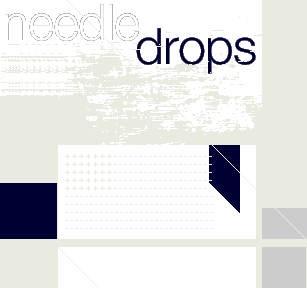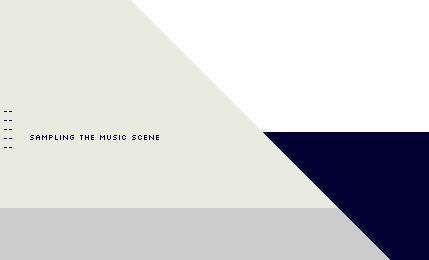


++ Contact Philip Sherburne ++
++ Recently ++
Tuesday, November 29, 2005 = The Stooges Unearthed (Again)
Tuesday, November 8, 2005 = Documenting Beulah And DCFC
Tuesday, November 1, 2005 = Out-Of-Control Rock 'N' Roll Is Alive And Well
Tuesday, October 25, 2005 = Just In Time For Halloween
Monday, October 3, 2005 = The Dandyesque Raunch Of Louis XI
Monday, August 15, 2005 = The Empire Blues
Tuesday, August 9, 2005 = David Howie's Sónar Diary
Monday, July 25, 2005 = Hot Sounds For Summertime
Monday, June 27, 2005 = Overcoming Writer's Block At Sónar 2005
Monday, June 4, 2005 = Cool New Sounds To Download Or Stream
++ Needle Drops Archives ++
View full list of Needle Drops articles...
|
|
 |
March 1, 2002
++ Boards Of Canada Cloning Experiment Goes Awry
++ One of the most highly anticipated electronic music albums of the year, Boards of Canada's Geogaddi is finally here. How highly anticipated, you ask? During its first week of release it was the #3 electronic album, behind only the Chemical Brothers' Come With Us and the Pulse compilation (a popular collection of commercial dance hits), according to Soundscan, which tallies CD sales around the nation. Not half bad for an obscure Scottish duo who live on a country commune, shrink from press, and haven't had a full-length out since their 1998 debut Music Has the Right to Children.
Like Geogaddi, Music Has the Right... was released on the independent UK-based label Warp. In the U.S., Music Has the Right... was licensed to Matador — a move that earned Boards of Canada a significant number of rock-oriented fans. Warp, the label Autechre, Aphex Twin and other highly regarded electronic artists record for, has since opened offices in the U.S., and thus Geogaddi is a Warp-only release, in the U.S. as well as the UK.
During the past four years, Boards of Canada have released one EP for Warp and made a handful of compilation appearances, but for the most part they've left rabid fans salivating for another fix of their mournful, synaesthetic downtempo. No surprise then that as the new release grew near, the buzz reached deafening proportions in some circles.
Let's talk about the buzz. How exactly does one measure buzz? Well, for starters, Warp — perhaps because they'd been burned by the experience of previous high-profile releases like Autechre's Confield being leaked to Napster well in advance of their release dates — declined to release more than a handful of promos, choosing instead to host listening parties in New York and London. A few lucky critics and fans wound up with super-limited promo 12-inches, but they were the exception. Even the band's U.S. publicists didn't get a copy of the album until a week or two before the street date. Months before then, fans were revving up on Internet mailing lists and message boards, debating the putative merits of an album they hadn't even heard yet.
After the listening parties, the lucky few in attendance fueled the debates with track-by-track post-game recaps. Not that it really gave anyone who wasn't there anything more to go on, but that's the nature of buzz: it's self-sustaining. (And it works in curious ways, especially given the speed — and, I hesitate to add, the general dumbing-down, or perhaps that's dumbing-up — afforded by the Internet. On one notoriously volatile mailing list, an off-the-cuff allegation as to the duo's sexuality led to the posting of an obviously fake album cover merging a pornographic photograph with typical BoC-styled design and lettering. I say obviously fake, but apparently it wasn't obvious enough, judging from the chorus of hostile reactions from people who thought that the duo had, indeed, emblazoned their cover with the image of an oiled-up, unbuttoned and fully exposed beefcake model. Will wonders never cease?)
All rumor-mongering, gullibility and gutter humor aside, it's pretty cool to see a group from such obscure origins do so well. I remember when "Hi-Scores," Boards' brilliant 12-inch for the English collector's label Skam, was littering the sale bins at the New York indie superstore Kim's Underground. I don't know how many of the turquoise-sleeved, six-track vinyl EPs were initially pressed — probably no more than a thousand or two. But even that paltry number outstripped early demand. Within a year or so, though, those same copies were fetching $35, $50, $100 on eBay. (And yes, I'm kicking myself for not having snapped up and pawned off the entire stash.)
Since they became objects of cult affection, Boards have cultivated this kind of fanaticism — their ultra-rare debut 12-inch, the "Twoism" EP, recently sold for $512 on eBay, with a second copy going shortly thereafter for $460. An earlier copy of the relic is actually reported to have sold for perhaps twice as much, but no record of the sale remains available at eBay. (A few years ago, the record was scarce enough that many listeners doubted its very existence — the Boards' old pals, it seems, may finally be cashing in on their erstwhile mates' sudden bankability.) Meanwhile, their cultural capital has increased as well. Last year the duo managed to snag the cover of Jockey Slut in the UK, and here in the U.S. they scored the cover of XLR8R around the same time. And even last week, an interview with the group was a big enough deal that it prompted NME's John Mulvey, in an email circulated on a BoC Yahoo group, to fudge a bit and proclaim his Q&A with the group "their first ever interview."
++ And so finally, suddenly, after a slow and steady buildup of buzz, the album is upon us — accompanied, perhaps, by that unique species of melancholia that comes with any long-anticipated object's appearance in the real world. Like a spoiled kid on Christmas morning, I find that the most eagerly awaited new releases almost invariably set me up for disappointment. I've imagined the cover would look just so, the music would sound just so — actually, that's not it at all. I've expected the design that would unseat all my assumptions about cover art; I've held out in hope of the sound that will transport me to that place, the one I know exists but that I've never, ever found. At least, never for more than a fleeting second.
And of course, the likeliest path to that kind of transcendence is almost always found in an undiscovered artist, or better yet an unheard genre, when the sounds seem to have arrived fully formed from some intergalactic broadcast. (I'll always remember my first experience with Georgian folk music this way, the curious modalisms presenting an entirely otherworldly idea of harmony, but one that made sense nonetheless — it was as though I'd stumbled upon a sonic Rosetta Stone there on late-night college radio.) Despite your expectations — or more likely because of them — you'll almost never, ever find that perfection in a follow-up album.
All of this is an elaborate way of saying that upon first listen, I was terribly disappointed in Geogaddi. As listener after listener will tell you, it's almost uncannily similar to Music Has the Right to Children. The album employs the same warping sounds, the same rice-crisp percussion, the same well-placed voices, but above all the same structure. Four-bar chord changes, intros and outros, long tracks and segues, calculated builds and descents. It is Boards of Canada as only Boards of Canada can be. Their sound is unique, without a doubt — but the record, it seemed, was not. "They've done it," I thought. "They've dug themselves into their hillside bunker, practiced on a few sheep, and finally come up with the impossible: they've actually cloned their own music."
++ But if you've read any of the mainstream coverage of recent cloning attempts, you probably know that a cloned animal doesn't necessarily come out exactly like its original. It's not just the spots that change, but the character, the temperament — dare I say, the soul. And in just the same way, in only a week of listening, Geogaddi, far from some spooky redux (Music Has the Right to Grandchildren, perhaps) is already turning out to be a very different beast altogether. Yes, the pattern is very, very similar to the first album, but once you listen a little further, there's a newfound depth. Once you internalize the sameness of the Boards' broader rhythmic schema (essentially, an easy downtempo glide, heavy on the one and the three), you notice the little details: the curlicued back-beats, the filigreed echoes, the frayed streamers of delay, the depth-charge "shoomp" of the beats themselves.
The tones are different, too. Not radically: they still have that dusty warble, but they're... deeper. I'm convinced that one member of the group, if not both, is a synaesthetic, simply for the way their music evokes a sense of color (not to mention the pigment-soaked designs of all their records, or the liberal use of colors in song titles — "Turquoise Hexagon Sun," "Roygbiv" — and flitting lyrical fragments — "orange," "yellow" — as though they'd packed their music with product placements for Sherwin Williams).
Geogaddi continues the obsession with tone color and marries it to a more extensive psychedelic edge (hence titles like "Sunshine Recorder," "Dandelion," "Dawn Chorus," "Magic Window," and the Lucy-in-the-sky literalism of the refrain, "1969 in the sunshine"). And the synaesthetic tendency doesn't end with the visible spectrum: it extends into texture and space itself. After initial orientation, Geogaddi opens up to reveal a space where every drum shot, every bloop, every gnarled vocoding stakes out a spot in a complex web of energy.
The more I listen, I find, the less I want to say about the record — at least for now. There is in fact something narcotic about Geogaddi, something that makes you want to shut up and slip inside its skin for an hour or a day. The longer you live in it, the better your eyes become accustomed to the particular quality of light, and the better your ears learn to image the rolling touch of its frequencies. "The Devil Is in the Details," reads one of their track titles. That's certainly true here. And the closer you approach, as you see your own reflection folded into his kaleidoscope eyes, the more uncanny his whispers become — as though he were reading your own mind. Perhaps there's some cloning going on here after all.
|
| |
|